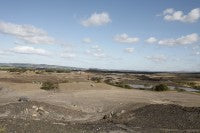From opencast coalmine to Championship Golf Course
 A former opencast colliery at Polkemmet is being transformed into two championship golf courses, leisure facilities and residential housing.
A former opencast colliery at Polkemmet is being transformed into two championship golf courses, leisure facilities and residential housing.
The project is the first of its kind in Scotland, and with support from WRAP (Waste & Resources Action Programme), up to 15,000 tonnes of quality compost will be used to construct the first six fairways of the championship golf courses. Ultimately more than 150,000 tonnes of compost may be used in the regeneration of the entire site.
Years of deep mine and open cast operations have left the site with more than four million cubic metres of colliery waste, devoid of any soil and in desperate need of remediation.
The site owners, Ecosse Regeneration, wanted to regenerate the land in a sustainable and cost effective way, avoiding the traditional method of importing new topsoil.
Ecosse Regeneration signed-up to WRAP's brownfield trailblazer programme following an earlier WRAP-funded pilot study on the site. This involved mixing quality BSI PAS 100 compost with screened colliery shale at various ratios to create new soil media, which were then seeded with turfgrass species.
The trailblazer programme is designed to help developers, designers and contractors investigate the financial and environmental benefits of specifying high quality compost in brownfield projects.
Project Manager at Ecosse Regeneration, Alex Muirhead, explained:
"We wanted to regenerate the site in a cost effective and sustainable way so we initially trialled quality compost mixed with colliery shale to manufacture topsoil on a small section of the site.
"Compost provides an excellent balance of water and nutrient retention properties when mixed with screened colliery shale and we were pleased with the results from the original trial, which showed rapid and uniform establishment of turf grasses without weed problems. The new soil will also be sufficiently free-draining to ensure that the golf courses remain playable under the wettest of conditions, which is most important given the local climate.
"The trials also produced cost benefits, particularly when comparing the cost of manufacturing soil containing compost and colliery shale to importing topsoil."
The main benefits from the trials were:
* Cost savings generated by import of locally available compost for soil manufacture, rather than import of topsoil
* Reduced maintenance costs
The compost for the project is being sourced from local suppliers GP Green Ltd (Lanarkshire), Forth Resource Management Ltd (Edinburgh), West Lothian Recycling (West Lothian), William Tracy Ltd (Ayrshire) and Scottish Water.
In addition to the innovative soil manufacture process, trees have been rescued from the bings (spoil heaps) on site and from the M8 extension works, and will be replanted into the new golf courses.
WRAP's Programme Manager for Landscape and Regeneration, Paul Mathers, said:
"The original field trials undertaken on this site show that manufacturing topsoil using a mixture of screened colliery shale and compost can not only provide ideal growing conditions for golf course turf, but can also significantly reduce the cost of regenerating the land when compared to importing topsoil."
Cabinet Secretary for Rural Affairs and the Environment, Richard Lochhead MSP, said: "This is an innovative use of compost and a forward thinking way of regenerating brownfield sites. As the home of golf it is great to see Scotland leading the way in developing sustainable and original courses"
The BSI PAS 100 certification means that the compost, which is produced from source segregated green waste such as grass cuttings, prunings and leaves, has been manufactured to a consistently high quality and is also safe, reliable and sustainable.
For more information on how quality BSI PAS 100 compost can help reduce the cost of brownfield regeneration projects, contact Paul Mathers at WRAP on 01295 817899 or visit www.wrap.org.uk/composting.
WRAP works in partnership to encourage and enable businesses and consumers to be more efficient in their use of materials and recycle more things more often. This helps to minimise landfill, reduce carbon emissions and improve our environment.
Established as a not-for-profit company in 2000, WRAP is backed by Government funding from Defra and the devolved administrations in Scotland, Wales and Northern Ireland.
Working in seven key areas (Construction, Retail, Manufacturing, Organics, Business Growth, Behavioural Change, and Local Authority Support), WRAP's work focuses on market development and support to drive forward recycling and materials resource efficiency within these sectors, as well as wider communications and awareness activities including the multi-media national Recycle Now campaign for England.
More information on all of WRAP's programmes can be found on www.wrap.org.uk
